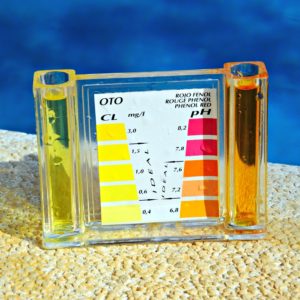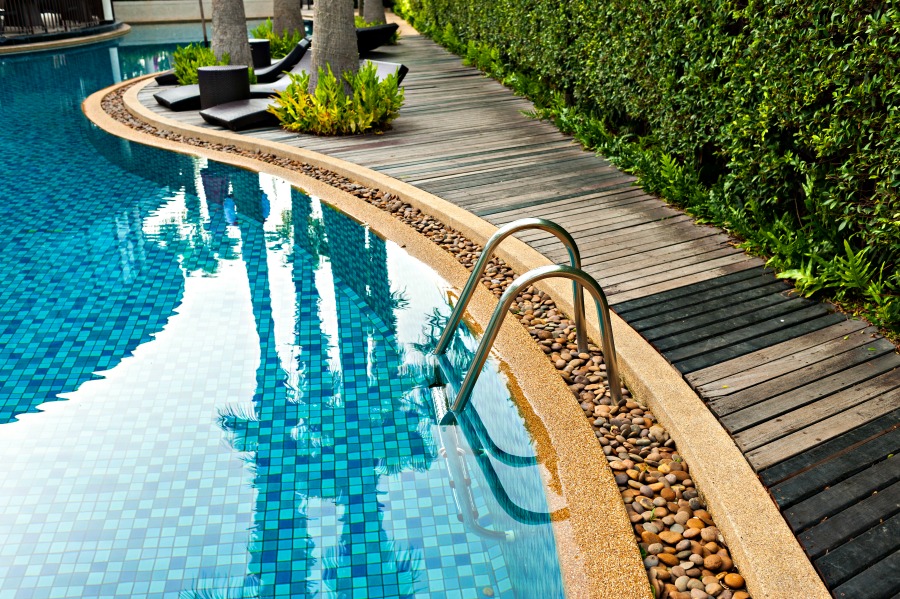We frequently convert one type of pool water from chlorine to a saltwater pool. We’ve done enough to warrant sharing what goes into the process. Saltwater is slowly catching up to chlorine pools in terms of popularity. The healthier and safer options are taking precedence when it comes to families. When last we mentioned saltwater and chlorine, we mentioned there is chlorine in both saltwater and chlorine pools. Yes, it’s true. The major difference is that in saltwater pools, there’s less chlorine. Let’s review…
In a chlorine pool, chlorine is added to the water via chemicals or a chlorine shock. Therefore, Chlorine is part of the entire pool system. In a saltwater pool, minor amount of chlorine is produced as salt molecules in the water are broken down. By converting from a chlorine pool to a saltwater pool means less maintenance. You also won’t need to balance your water’s pH levels as often. Chlorine pools are very subjective to the pH scale, while saltwater pools are the opposite.
Pros and cons can be found for converting from a chlorine pool to a saltwater pool. We’ll cover everything we’ve come across thus far in our own conversions with clients.
Pros of Saltwater Conversions
- Cost savings — because chlorine is naturally created from the salt, you don’t need to purchase additional chemicals, shock treatments or chlorine tablets.
- Time savings — maintenance time drops when you don’t need to regularly check the chlorine levels. This comes as a result of setting your desired level of chlorine production and letting it run automatically.
- Health improvements — saltwater eases the abuse chlorine has on your skin, the harsh feeling and smell of chlorine is gone (no more chloramines to produce the “chlorine” smell)
Cons of Saltwater Conversions
- Acidic pH levels — the salt will eventually throw off your water’s pH scale. You or your maintenance crew must keep the pH levels in check
- Excess Calcium — to avoid calcium buildup and damage to your salt cell, maintain the pH levels
- Replacement — every 3-7 years, your salt cell will need to be replaced. Average cost ranges from $200 to $700 (if you convert, plan ahead and budget!)
- Wear & Tear — salt is naturally a corrosive natural mineral that can cause problems to ordinary plumbing and the human body. If you’re worried about salt from the conversion process damaging your pool’s internals, contact your local pool team for their opinion. Let the experts who deal with pools on a daily basis, give their opinion on wear and tear
Narrowing Your Package
We advise not stressing your pool system with salt. Stretch out the life of your parts by going with a large system for a small pool. This way, everything can function at a moderate capacity without overloading. For example, a small system in a large pool would cause immediate problems. Balance out the size of your pool with the salt system and then adjust for a larger system.
With that upgraded size, comes an increased price. Saltwater conversions can range in cost from $500 to $2,500. Keep in mind, the basic systems won’t include all the features. Figure out what will work best for your pool size and budget.
As we mentioned earlier, salt cell replacement will be important every 3 years at minimum and 6-7 years at the maximum. Going with a system for moderate capacity will extend the life of your salt cell and other parts as well.
The details of performing the install can be difficult to explain over words unless you are extremely versed in your pool system. We suggest calling your local pool maintenance team for specifics. If you’re local to the Bradenton and Lakewood Ranch, Sarasota, Florida areas, give us a call! Erik’s team is happy to speak to current pool owners about converting to saltwater.
REFERENCES:
- http://www.saltwaterpoolandspa.com/salt-water-pool-conversion.html
- http://www.inyopools.com/Blog/converting-your-pool-to-saltwater/
- https://household-tips.thefuntimesguide.com/salt_water_swimming_pools/
Erik’s Aquatic Care is always here to answer questions you may have as a current or future pool owner. Cheers!

